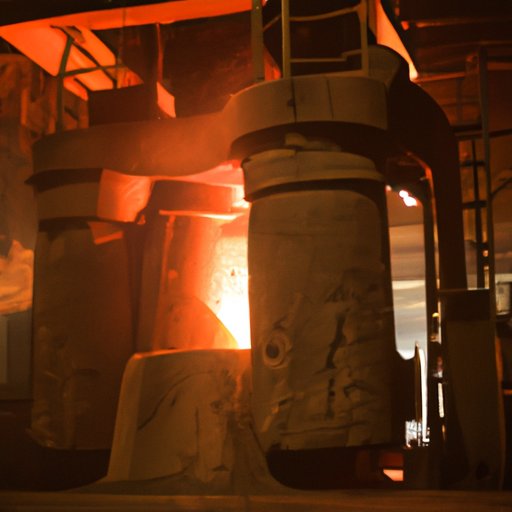Introduction
The Bessemer Process was a revolutionary method of mass-producing steel developed in the mid-19th century by British inventor Henry Bessemer. It revolutionized the global manufacturing industry and paved the way for modern industrial production. By using air to oxidize impurities in molten iron, the Bessemer Process allowed for the efficient production of large quantities of high-quality steel.
Analyzing the Impact of the Bessemer Process on Different Industries
The impact of the Bessemer Process was far-reaching and its effects were felt across a variety of industries. The process enabled the mass production of steel, which could be used to make everything from tools and machines to bridges and buildings. This allowed for a rapid expansion of construction and manufacturing, as well as a sharp decrease in the cost of producing goods. Other industries that saw significant benefits from the Bessemer Process included shipbuilding, railroad construction, and mining.
To better understand the impact of the Bessemer Process, it is important to analyze how each industry was affected. For example, the development of the Bessemer Process allowed for a dramatic increase in the production of steel, which made it much more affordable. This had a direct impact on the shipbuilding industry, as steel ships were now much cheaper to produce than wooden ships. Similarly, the Bessemer Process enabled the rapid expansion of the railroad industry, as steel rails were now much more cost-effective to manufacture.
The Bessemer Process also had a major impact on the mining industry. By greatly reducing the cost of producing steel, it allowed miners to use larger and more powerful equipment, which in turn allowed them to extract more resources from the ground. This led to an increase in the efficiency of mining operations and a decrease in the cost of extracting resources.

How the Bessemer Process Changed the Steel Industry
The Bessemer Process had a profound effect on the steel industry, ushering in a new era of steel production. Before the process was developed, steel was produced in small batches and was expensive and time-consuming to produce. With the Bessemer Process, however, steel could be mass-produced with greater efficiency and at a lower cost. This allowed for a dramatic increase in the production of steel, which in turn had a huge impact on other industries.
The Bessemer Process also enabled the development of new types of steel. By oxidizing impurities in molten iron, the process allowed for the production of higher-quality steels with improved strength and durability. This allowed for the creation of new and more advanced products, such as reinforced concrete, which in turn had a huge impact on the construction industry.
Conclusion
The Bessemer Process revolutionized industrial production and had a huge impact on a variety of industries. The process enabled the mass production of steel at a much lower cost, which had a direct impact on the shipbuilding, railroad, and mining industries. It also enabled the development of new types of steel, which allowed for the creation of more advanced products. Ultimately, the steel industry was the biggest beneficiary of the Bessemer Process, as it allowed for a dramatic increase in the production of steel and the development of new types of steel.


